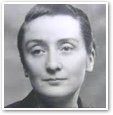Counting on Mercy
- SERVANT OF GOD MADELEINE DELBREL
We cannot let mercy dry up, as so often happens today.
 A greater awareness of the economic hardship of the masses cannot lead us to have scorn for other forms of suffering, or to lose interest in them.
A greater awareness of the economic hardship of the masses cannot lead us to have scorn for other forms of suffering, or to lose interest in them.
Christ's mercy for the poor is one part of a mercy as vast as all the human griefs combined. It is a mercy for sinners, a mercy for the sick, a mercy for those lamenting their dead, a mercy for those in prison, a mercy for all the little ones.
Because of a reductively materialistic notion of poverty, we are often in danger of forgetting that there are people who are poor in other ways than merely economically; there are other little ones than the workers. There are those who are morally or psychologically weak. There are those who are poor in gifts, in appeal, in love. In addition to the oppressed classes are those who are "unclassifiable."
Those who are little, those who are poor, are not only in the working class. And the working class itself is not made up exhaustively of militants, militants who are already rich in hope, rich in heart, rich in intellectual formation.
It is not up to us to correct Christ's heart either — it belongs to all people and we have to give it to all people.
The personal love of Christ, He calls each one by name — he does not call a category. He knows each one of us as the Father knows the Son.
 This is Meaghen Gonzalez, Editor of CERC. I hope you appreciated this piece. We curate these articles especially for believers like you.
This is Meaghen Gonzalez, Editor of CERC. I hope you appreciated this piece. We curate these articles especially for believers like you.
Please show your appreciation by making a $3 donation. CERC is entirely reader supported.

Acknowledgement
 Madeleine Delbrêl "Counting on Mercy." from We, the Ordinary People of the Streets. (Sherbrooke, QC: Mediaspaul, 2000).
Madeleine Delbrêl "Counting on Mercy." from We, the Ordinary People of the Streets. (Sherbrooke, QC: Mediaspaul, 2000).
This excerpt appeared in Magnificat in November 2016.
The Author
 Madeleine Delbrêl (1904-1964) was a French Catholic author, poet, and mystic, whose works include The Marxist City as Mission Territory (1957), The Contemporary Forms of Atheism (1962), and the posthumous publications We, the Ordinary People of the Streets and The Joy of Believing. She came to the Catholic faith after a youth spent as a strict atheist. She has been cited by Cardinal Roger Etchegaray as an example for young people to follow in "the arduous battle of holiness."
Madeleine Delbrêl (1904-1964) was a French Catholic author, poet, and mystic, whose works include The Marxist City as Mission Territory (1957), The Contemporary Forms of Atheism (1962), and the posthumous publications We, the Ordinary People of the Streets and The Joy of Believing. She came to the Catholic faith after a youth spent as a strict atheist. She has been cited by Cardinal Roger Etchegaray as an example for young people to follow in "the arduous battle of holiness."




